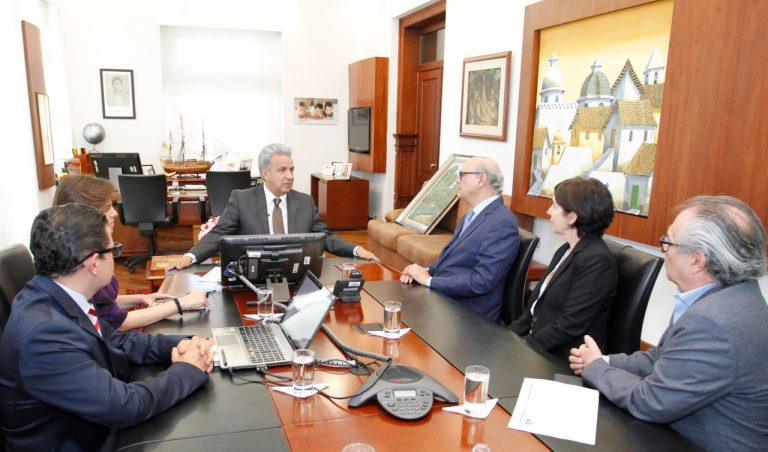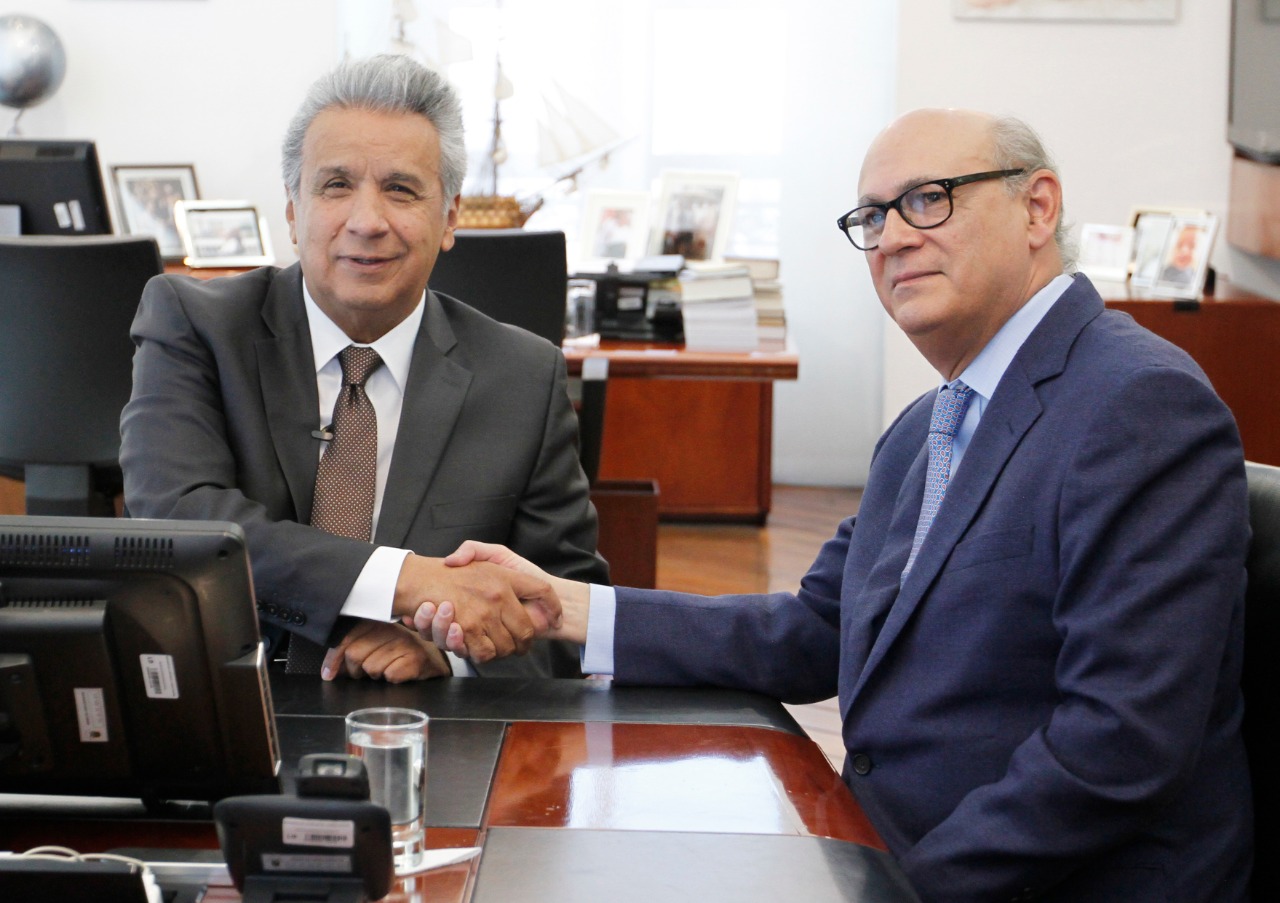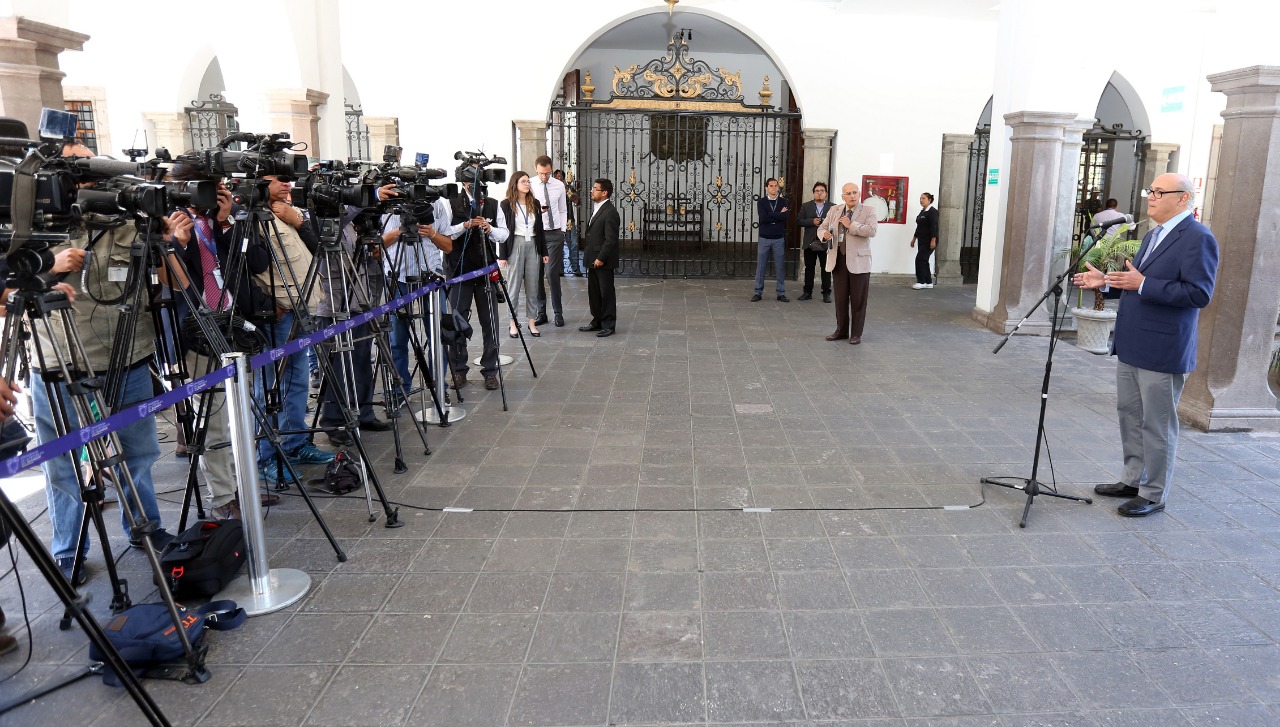9 de agosto 2019

Children of Exile: The Births “Sowing Hope” in the Camp of Nicaraguan Farmers

PUBLICIDAD 1M
PUBLICIDAD 4D
PUBLICIDAD 5D
Ecuadorian President says his government will maintain its support to implement the OAS resolution, of Medellin, against the regime of Daniel Ortega.

Ecuadorian president Lenin Moreno talks with Carlos F. Chamorro, accompanied by his wife Desiree Elizondo, advisor to the Asociación de las Madres de Abril. To the right of Moreno, the Minister of Government, Maria Paula Romo. Photo / Courtesy / Presidency of Ecuador
Lenin Moreno came to the Presidency of Ecuador in May of 2017, after a decade under the authoritarian, despotic and corrupt mandate of Rafael Correa (2007-2017). The Ecuadorian President has taken a drastic turn in the way of doing politics in the Andean country: more open to democracy and without persecuting his opponents and critical media.
Moreno received this week the Nicaraguan journalist in exile, Carlos Fernando Chamorro, director of Confidencial and the programs “Esta Semana” and “Esta Noche”. The meeting between them, scheduled since April of 2019, lasted more than an hour.
Chamorro spoke on the program “Esta Noche”, about the meeting with Moreno, who defined in one single sentence the position of Ecuador on the crisis in Nicaragua: “In a democratic regime in Latin America, only one dead person is enough to change a government.”
Chamorro said that Moreno conveyed a message of “total and unconditional solidarity with the Nicaraguan media, with the journalists and with the Nicaraguan people, in their struggle for freedom of expression.”
How did this meeting take place and what was its objective?
Carlos F. Chamorro: Since April we have received an invitation from the Minister of Government of Ecuador, Maria Paula Romo, about the interest that existed in her government and in her country to receive firsthand information regarding the crisis of the dictatorship in Nicaragua. That meeting could not be held then, but it finally happened on Tuesday (August 6, 2019). President Moreno received me with my wife Desiree Elizondo, who has been involved since the April crisis, supporting the demand for justice without impunity for the victims of repression.
My objective was to do a journalistic interview. That was not possible but we did have a conversation for almost an hour.
Its noteworthy that President Moreno made a complete turn of what was the previous policy of President Correa, redirecting Ecuador towards democracy, lifting the persecution that existed against the press.
Ecuador is one of the members of the Working Group on Nicaragua of the Organization of American States, and therefore has a lot of interest in the national crisis.
What is Ecuador’s position on the crisis in Nicaragua?
CFC: President Moreno summed it up in one sentence: In a democratic regime in Latin America, only one dead is enough to change a Government. And what has happened in Nicaragua, he says, with hundreds of dead, is something truly inadmissible.
When he talked about it, he reminded me that in 1997, in Ecuador there was a series of popular civic protests against the Government of Jamil Mahuad, whom eventually left power. I did an interview with Daniel Ortega, when he was the leader of the opposition that year, in which he boasted of the protests that he was making against the Arnoldo Aleman Government, and he said: look at the case of Ecuador, people go to protest civically and there was not a dead man and the government had to leave.
And in Nicaragua, when Ortega faced the challenge of the population that demanded democracy and justice, not only did he cause one dead, he caused hundreds of deaths. So that this is inadmissible not only for Nicaraguans, but in the context of Latin America, a ruler who has caused a massacre and a slaughter of this type should not be entitled to continue governing. That is the feeling that I perceived from the president and the Government of Ecuador.

The President of Ecuador, Lenin Moreno and journalist Carlos F. Chamorro. // Photo: Courtesy / Presidency of Ecuador
About the situation of journalists and freedom of the press in Nicaragua, what did president Moreno say?
CFC: He is very well informed on the situation of Nicaragua, the repression against the press, the imprisonment against Miguel Mora and Lucia Pineda Ubau has been a worldwide issue. The confiscation of Confidencial and “100% Noticias” (100% News), the assault and persecution against journalists, the exile of journalists, especially the resistance of the press. Moreno said basically that those are inalienable principles.
Moreno speaks from the perspective of his own Government, which has been restoring values and principles of freedom of the press and freedom of expression that were also infringed upon by the previous government of Rafael Correa. He said, well I am trying to restore these principles in Ecuador, which should not be violated or infringed in Nicaragua.
His position was of total and unconditional solidarity with the Nicaraguan press, with journalists and with the Nicaraguan people, in their struggle for freedom of expression.
Ecuador is one of the 21 signatories of the OAS resolution in Medellin, which mandates the creation of a high level diplomatic commission to dialogue with the dictatorship, what are the expectations, in that sense?
CFC: The expectations are based, on the one hand, on the political will of the Latin American governments, and particularly Ecuador, to continue supporting Nicaragua, the Nicaraguan people, in their struggle for the restoration of human rights. But, on the other hand, very realistically, and at some moment of this exchange, President Moreno said: how can you dialogue with the dead? He said that the dead do not dialogue. He is referring to a real situation happening in Nicaragua, that after the massacre, there is a demand for political dialogue, which is even being violated by the Government, but at the same time, he said that the only way out are free elections.
The only way out is that in Nicaragua conditions be restored so that the votes can be counted with transparency, and that the opposition can participate together in an election. So what he basically said was: the people of Nicaragua can count on the support of Ecuador for the efforts that are being made in the OAS for the implementation of the resolution approved in Medellin, although it is clear that you are struggling against the current, against a dictatorship, which until today does not accept the demand for political dialogue.

Journalist Carlos F. Chamorro in a press conference with Ecuadorian media. // Photograph: Courtesy / Presidency of Ecuador
Does it mean that there is an expectation on the part of Ecuador for a possible political solution, and what would happen in the future in Nicaragua?
CFC: The interesting thing is that President Moreno presents himself as a progressive political leadership, who is routing his country in a democratic direction and says that in Ecuador we are doing things that maybe could be useful in Nicaragua, for a society post-Ortega dictatorship. He is talking about cancelling the political espionage operations that existed in his country, about fighting corruption, about restoring the democratic institutions of Ecuador, which were subject to the authoritarianism of President Correa.
So he said: We support Nicaragua today, and we will support it tomorrow, and we hope that some of the tasks that are being carried out here may also be useful and supportive for a future government in Nicaragua, once this dictatorship ends. So there is a solidarity with the people of Nicaragua and with the aspirations for change of the Nicaraguan people.
You spoke during the meeting about the situation of Confidencial, of the newsroom.
CFC: President Moreno specifically asked about the case of Confidencial and 100% Noticias. We informed him widely of the facts, and the facts are that since December 14, the newsroom of Confidencial remains illegally occupied by the National Police. We have denounced this as a de facto confiscation. It is illegal, it violates the right to property, to freedom of the press, freedom of enterprise of the Invermedia company (producer of Confidencial), and Promedia (producer of Esta Semana) are being violated.
There was never a court order to justify this action against Confidencial, because it does not exist, because there is no legal or administrative support. However, there is justification provided by the head of the National Police (Commissioner Francisco Diaz) before the Constitutional chamber of the Supreme Court, alleging that by confiscating Confidencial they were fulfilling a mandate from the Interior Ministry against the NGO CINCO. But, there is no relationship between the NGO CINCO and the media-producing companies of Confidencial and Esta Semana. The same in the case of 100% Noticias, and we have the support of all the chambers of the business sector.
Archivado como:
PUBLICIDAD 3M
Confidencial es un diario digital nicaragüense, de formato multimedia, fundado por Carlos F. Chamorro en junio de 1996. Inició como un semanario impreso y hoy es un medio de referencia regional con información, análisis, entrevistas, perfiles, reportajes e investigaciones sobre Nicaragua, informando desde el exilio por la persecución política de la dictadura de Daniel Ortega y Rosario Murillo.
PUBLICIDAD 3D